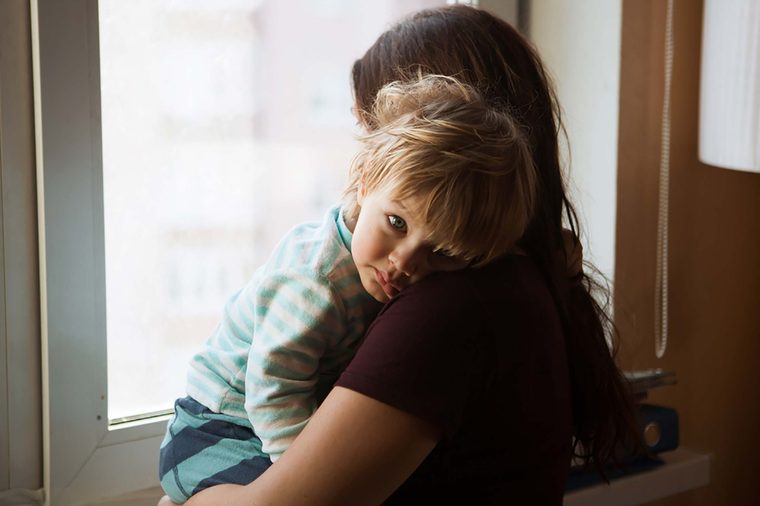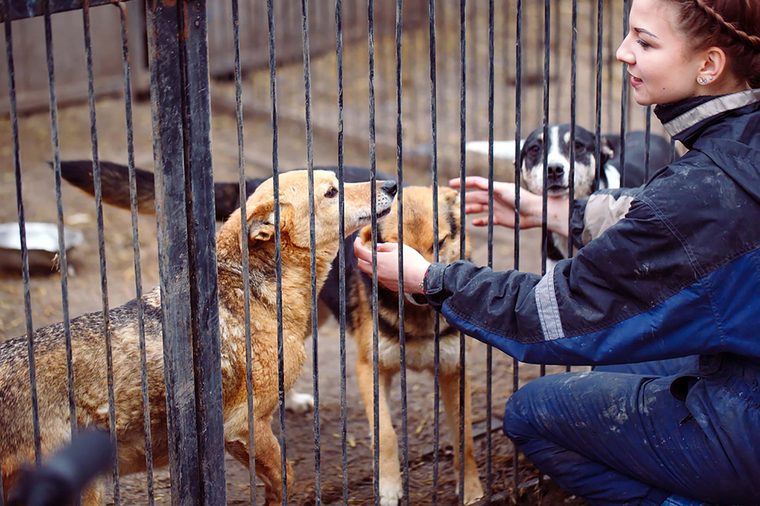
Your feelings are real
There’s a misconception that people can easily move on from a traumatic experience. A traumatic experience is a shocking, scary, or dangerous experience that affects you emotionally, according to the National Institute of Mental Health. It could be a natural disaster, a life-and-death struggle with an illness like Covid-19, a car accident, a crime, a death, or a violent attack that left you feeling helpless, frightened, or out of control.
Afterward, you may insist to others—and yourself—that you’re okay because physically, you’ve survived. But that doesn’t mean the experience didn’t leave emotional scars. We spoke a mental health expert and a trauma survivor who both weigh in on the steps to take to help you heal from a traumatic experience.

Admit what you’re going through
“When danger presents, it shakes the foundation of our predictable world, and as such, we react internally with neurobiology moving into ‘fight or flight’ mode,” says Deborah Serani, PsyD, an American Red Cross Disaster mental health specialist and the author of Living with Depression. “If the danger is enormous, or bodily harm has occurred, it can cause a traumatic reaction.” This may include intense feelings of anger, sadness, anxiety, guilt, or confusion. You may also feel numb or easily agitated.

Don’t repress negative feelings
Sometimes, overly positive thinking can backfire—you’ve got to allow yourself to feel bad after a traumatic experience. “Often, when I work with children and adults with traumatic reactions, I teach them about what trauma does to our bodies, how it needs to have time to be processed to make sense to us, and then how to move forward with reclaiming your power and your story,” Serani says. “Everyone moves through recovery at different rates. But when you understand the uniqueness of trauma, it gives you permission to move through it at your own pace.” In doing so, feelings of powerlessness and fear can give way to greater strength and resiliency, she says.
Do Positive Affirmations Really Work? Here’s What Mental Health Experts Think

Deal with emotions one by one
Humans can feel 27 different categories of emotions, and if you’ve been traumatized, you’ve probably felt all of them. “You’ll always have many different and conflicting emotions,” says trauma survivor Susan Mattern, Southern California-based speaker and author of Out of the Lion’s Den. Her daughter was attacked by a mountain lion while the family was hiking. The little girl survived, but her recovery lasted years and left her with permanent injuries.
“My emotions fluctuated on a minute-by-minute basis—I was angry that the attack had happened, grateful she was alive, sad that she had to suffer, frustrated by doctors and therapists and blood tests, happy with friends.” She describes it as mixing colors together that just end up an ugly brown. “Some emotions I didn’t even realize I had until years later, but I gradually dealt with them one by one, till my life turned from brown to a few colors,” she says. For example, if she was angry, she wrote a letter to a newspaper, spoke to a person in charge, or called someone to talk. “Do something about one of those emotions, then pick another,” she suggests.

Take comfort in faith, or reexamine it
Some trauma survivors find strength from their religious faith. But for others, it can cause a break in faith, which is OK too. “I simply lost my faith, because I couldn’t understand how there could be a god who permitted so much suffering in the world,” says Mattern, a former nun. “I spent many years trying to regain my faith. But once I realized that the world and my life made a lot more sense without a god, then I felt a great sense of freedom.” She no longer believed she was being punished, but rather that her daughter’s attack was a random act. “Trauma isn’t a religious test or event, but you can make the choice to find good in it or let it defeat you,” she says. “When I realized that this life is probably the only one we have, I began to value it a lot more.”
I Practiced Mother Teresa’s Meditations Every Day for Week—Here’s What Happened

Find a new purpose
It might be volunteering, teaching a class, taking care of a loved one, or even rescuing animals—but finding a new meaning in your altered world can help you reconnect. “Sometimes after a trauma, we realize that the purpose we had in our lives—material goals, like a new or bigger house, more money, the car, vacations—have less and less meaning,” Mattern says. “We begin to see a purpose-built on human relationships, spending time with people, helping others, discovering ourselves. Instead of ‘doing,’ we can concentrate on being.'”
You’ll Age Better If You Have This One Simple Thing, According to Science

Set small goals
Of course, it may not be that easy to find something to take your mind off the traumatic event, especially if you’re experiencing depression or anxiety. Mattern suggests starting small. “Sometimes when you feel hopeless, you don’t want to do anything—so writing a book, learning a language, or changing your lifestyle is just too big,” she says. “Make tiny goals. Write for ten minutes; buy the Spanish book and look at one lesson; start walking around the house for a few hundred steps.” These baby steps will give you a feeling of success. This will little by little help you feel better about yourself. You could even try rock climbing to treat your depression.

Reach out to others who understand
As much as you want to take comfort in your loved ones, they might not totally get what you’re going through—or, they might be going through their own trauma too. “After our daughter got attacked and almost killed by the mountain lion, my husband just didn’t have the strength to work all day, then get home and talk about things related to the event,” Mattern says. Instead, it may be helpful to find a support group or someone to talk to who’s outside your life but has been through something similar. “It was impossible to find someone whose daughter had been attacked by a mountain lion, but there were many people who had suffered injuries and were in the hospital—head traumas, motorcycle accidents, illnesses—and they all understood,” Mattern says.

Break free of replaying the event
One of the silent signs you might have post-traumatic stress disorder (PTSD) is reliving the event over and over again in your mind. “Your mind, body, and soul try to unravel the traumatic effects, but can get overloaded at times,” Serani says. As you try to make sense of what happened, you can get stuck in a replay loop in your mind. “Grounding techniques that help you stay in the moment by engaging your senses can slow the rate of flashbacks,” she suggests. This could be listening to loud music, holding a piece of ice, smelling something strong, biting a lemon, or taking inventory of what you see around you. Also, “calming self-talk, like, ‘This is now and I’m okay,’ or ‘I am strong,’ can redirect your thoughts to more comforting images,” Serani says. Here’s how to recognize the signs of PTSD.

Establish a sense of safety again
Trauma can shake your belief in the world as a safe place. “We are creatures of habit, so things that make us feel safe in our lives have structure, predictability, and comfort,” Serani says. Trauma erases all of that, so part of recovery is reestablishing a sense of safety. “For a long time after, I just expected things to be bad,” Mattern says. “And when life finally started to get better, I was always waiting for the next ‘bad’ thing to happen. It takes a long time to finally breathe again.”
So how can you do that? Mattern says she had to let go of the worry that was consuming her. “I spent so much time worrying about things that would never happen, and then the one thing that I never dreamed of happening, did happen,” she says. A lot of people, especially those who struggle with anxiety, probably feel this way currently about the coronavirus situation Mattern says she started confronting her fears. Although she was scared of flying, she took trips to Europe and Hawaii, and that fear disappeared. “You might never feel ‘safe,’ because now you know what things can happen, but worrying about any of them is useless,” she says.

Don’t expect to find answers right away
A traumatic experience may eventually help you lead a more meaningful life—but don’t expect that to happen anytime soon. Even five years after her daughter’s attack, Mattern was still at a low point. She was depressed, had lost her faith, given up her job, her marriage was holding on by a thread, and her daughter was still suffering from her injuries. “One night I had a dream I was standing in a garden, one I had planted so long ago and forgotten about,” Mattern says. “It had been growing all this time, and was beautiful.”
She realized it represented her life, and that helped her turn a corner. “I learned that love of family, life, and friends were the most beautiful gifts I could have ever hoped for,” she says. Even though the traumatic event itself was meaningless, that doesn’t mean that you can’t—eventually—derive meaning from it.
A Psychologist Explains How Making a Bucket List Can Make Your Life More Meaningful

Reach out for help
What psychologists most wish people knew about depression, anxiety, post-traumatic stress disorder and other mental health issues that can result from trauma is that help is available. The National Alliance on Mental Illness has a hotline you can call 10 a.m to 6 p.m. ET, Monday to Friday: 1-800-950-6264. You can also email for information or [email protected]. If your situation is dire or you need to speak with someone after hours, call the Suicide Prevention Hotline at 1-800-273-8255.
“If you find yourself struggling to meet your daily routine, and are having sleeping or eating difficulties, it’s vital to consult with a physician, nurse practitioner, or mental health expert to evaluate your health,” Serani says. Turning to alcohol or drugs to cope is another warning sign. “Support groups are excellent for children and adults with mild trauma, but for more moderate and serious traumatic reactions, individual therapy may be more effective for recovery.”
For more wellness updates, follow The Healthy on Facebook, Instagram, and Twitter. Keep reading:

